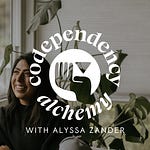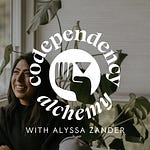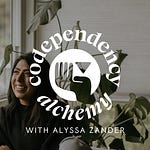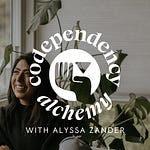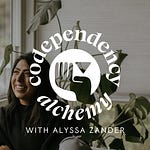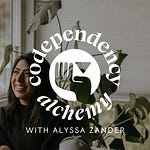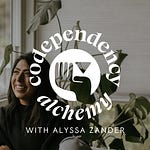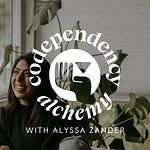"I recognize a part of my newly identified codependency is focused on eating habits with my partner. Do you have any content focused on this? I'd love to learn more on how to approach a better relationship with food, as it's a shared experience when you're living with a partner."
Today I’m answering a question that came through in the DMs (yes, I check my DMs and I love responding and connecting with you guys there!). This one stood out to me because it’s actually something Justin and I have been navigating this past year, as we have different goals (and palettes). Justin has held his own boundary around what he wants to eat while he is on his own health journey, and it doesn’t align with what I desire to eat.
This brought up a lot for me in the beginning. I was annoyed, frustrated, and overwhelmed. I was making his choice mean that he didn't want to cook meals with me anymore, and the responsibility for figuring out what I was going to eat solo was also unnerving… and you’ll see me get to the root of why that was in this episode.
In this week’s episode I take this question as a launching point to discuss codependency patterns related to food choices and eating habits within relationships, and how we can build healthier dynamics and self-trust.
What steps can we take to build self-trust around making healthy choices for ourselves?
Healing codependency is all about safety, and safety is something we build up for ourselves through tons of micro-moments where we show up for ourselves again and again. It’s literally like building a muscle, and we build muscle through moments of strain and resistance. Growth takes place when we push through that pain. Self-trust is what we get when we show up for ourselves despite the resistance.
Start small: Start by making a meal plan for one week of healthy, balanced meals that support your health goals. Doing this helps us build evidence that we can do this independently.
Do your shadow work: When fears or negative stories come up about making choices alone, do shadow work to uncover the core beliefs and needs behind them. Validate the part of yourself that harbors the fears and limiting beliefs.
Play with autonomy: Commit to practicing autonomy by going through with healthy habits like working out alone, even when anxious. Again, we are piling up evidence that we are safe and capable to do things solo.
Rewrite negative stories with compassion: I like to think about what I want to tell this part of me that has fears around being alone/doing things alone. What do I want this part of me that fears being alone to know? This is how we reparent ourselves.
Lean on community: Sometimes we can feel isolated and alone in our experiences, so finding community (hi, right here!) can help us in feeling seen and more empowered in our ability to make choices that support our well-being.
“Your vision will become clear only when you can look into your own heart. Who looks outside, dreams; who looks inside, awakes.” - C.G. Jung
Shadow Work Prompts
I love playing with shadow work prompts as a way to create more awareness of my unconscious patterns, tendencies, and thoughts. It literally feels like the cheat-codes to unlocking my peace and happiness because once I become aware of the root of the pattern I immediately feel compassion for it. Bringing our consciousness awareness to our shadow selves is how we come back into remembrance of our wholeness, and ultimately where peace and joy reside.
What are we afraid will happen if we aren't eating the same things as our partner? What does it mean about us or the relationship?
What are we making eating the same thing mean about our relationship?
What need or want are we desiring to get met through eating with our partner?
How old is the part of us that has these fears? What does that part want and need?
What core stories are we telling ourselves about not making good food choices independently or quickly enough?
How can we start flexing our self-trust muscle and gaining evidence that we are safe and capable of taking care of ourselves?
How we can support each other in our relationships
Communicating our goals and needs clearly while also respecting our partner's autonomy over their own journey is one of the greatest gifts we can give our relationships. Justin clearly communicated his needs and goals and went forward with meeting them for himself. It triggered the fuck out of me, but it modeled for me how I could show up for myself in the same way.
One of the fears I had was that we weren’t going to be able to connect the way that we were when we were making meals together, so we found new ways to connect that are separate from shared activities like cooking/eating and made our quality time come through evening walks and weekend dates.
At the end of the day, I want my partner to succeed in whatever is challenging him. I want him to find joy through that so it’s important for me to express my care, validation and encouragement for his efforts rather than judgment. (And I want that for me, too!) Celebrating each other and the goals we’ve managed to achieve has really strengthened our relationship.
I constantly remind myself of how I desire to feel in my relationship and this is way more aligned then what I was doing before, which was complaining and feeling resentful over not eating the same meals together.
Now we get to thrive autonomously, and that feels so fucking good.
Want to unpack this more?
Unraveling from codependency is a journey, and if you’re like me, the more awareness you have around it the more you realize it’s snuck its claws into every facet of your life. It can feel overwhelming and leave you feeling defeated.
If you want to dive in deeper to how codependency shows up in your life, you can grab Codependency Alchemy: The Course for 25% off this month! Just use promo code “BOUNDARIES” when you check out!





